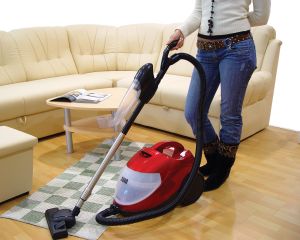 Cleaning House...
Cleaning House...How to Break a Bad Habit: 5 Powerful Tips
By James Malone
How to break a bad habit is a topic that puzzles many people. Very often we persist in behaviors that can have negative and sometimes life-threatening consequences, yet like the Energizer Bunny, you just keep on going and going and going...
For starters, it is helpful to consider what is meant by habit. Our friend Webster defines it as "a customary behavior pattern." What is also known is that thought, feeling and action can be broken down into two broad categories, conscious and subconscious.
The conscious mind refers to the part of the self that is critical and analytical; it thinks and it reasons. This is the part of the self that recognizes that whatever rewards or satisfaction are being derived from the problem behavior are outweighed by its consequences.
Your subconscious mind refers to the part of the self that is habitual and automatic, it does not think or reason it simply responds in the way that it has been conditioned to do. Most habits are benign and even useful like brushing your teeth, automatically using a turn signal when driving and so on. Yet habits can also be horribly destructive such as in the case of those persons who continue to use alcohol and drugs in a destructive fashion even when the negative results are obvious.
So is there anything that can be done? Sometimes it is necessary to get outside help, especially if the situation poses an imminent health and safety. Yet whether you get professional assistance or not, here a five tips you may find helpful.
Expect it to feel strange at first when you stop. Try this experiment. Lace your fingers together and notice which thumb rests on top-the right or left one. Now separate them and intentionally re-clasp with the opposite thumb on top. Feels strange, right? Any change good or bad will feel awkward at first-it usually takes about a month for it to feel normal for you.
Get past the notion of helplessness. It is a popular view that many problem behaviors are lifelong and uncontrollable, yet the science behind this notion is poor at best. Quite a few people for example, drink alcohol heavily during their college years and then go on to discontinue this unhealthy behavior as the responsibilities of work and family take on more prominent roles. Believe it or not the most successful method of getting past a problem behavior is simply deciding to stop. Expect to evolve.
See the behavior in the total context of your life. Remember the Rolling Stones song about "I can't get no, SATISFACTION!" Is it that you are an "addict" or that you are simply unhappy with your life in general? Public health data tells us that while 10% of doctors and lawyers smoke, over 60% of waitresses are smokers. The former group probably tends to find life more satisfying than the latter. What active steps would you have to take to improve your personal, professional and spiritual life? The drinking/smoking/drugging/overeating is certainly not getting the job done!
Intentionally remove the cues of the old behavior. Although we scarcely recognize it, most of our actions follow a predictable sequence of events, where a stimulus provokes an unconscious reaction. Do you drink to excess with a certain group of people? Stop hanging out with them!
Remember you are worth it! You may feel ashamed of yourself because of your past behaviors. This can set a trap where you don't feel worthy of a better life, which in turn causes you to dull this pain with the habit that has complicated your existence. Consider accepting this idea. You are worthwhile simply because you were born a child to human parents. There has never been anyone quite like you in the past, nor will there be another person exactly like you in the future. There is a reason that you are here right now-find it.
Could you use some extra help in taking back control of your life? Want to give that bad habit of yours the bum's rush? The Power of Positive Habits is like having your own personal guide to the powers of the inner mind-sort of like a Sherpa of the Subconscious!
Article Source: http://EzineArticles.com/?expert=James_Malone















Post a Comment
<< Home